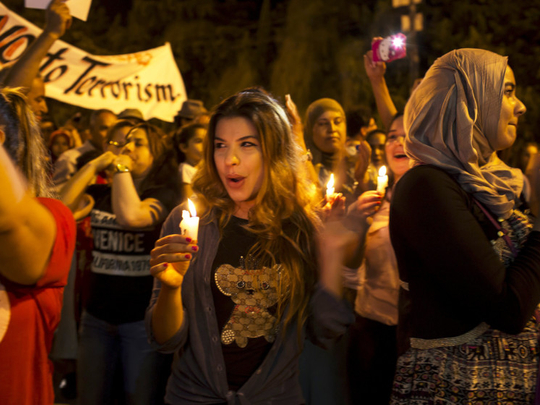
Tunis: Hundreds of armed police began patrolling the streets of Tunisia’s beach resorts on Sunday and the government said it will deploy hundreds more inside hotels after the militant attack in Sousse that killed 39 foreigners, mostly Britons.
Thousands of tourists have left Tunisia since Friday’s attack, which has shocked the North African country that relies heavily on tourism for jobs and foreign currency revenues.
Britain’s Foreign Office warned late on Saturday that militants may launch further attacks on tourist resorts in Tunisia after a gunman opened fire on the Imperial Marhaba resort, in the worst assault of its kind in modern Tunisian history.
At least 15 Britons, besides German, Irish and Belgian nationals, were among the dead and wounded in Sousse, a popular resort town. It was the most significant attack on Britons since the attack on the London transport system in 2005.
“We are going to deploy 1,000 armed police to protect hotels and tourists,” Tunisian Interior Minister Najem Gharsalli told reporters late on Saturday night.
Since its 2011 uprising to oust autocrat Zine Al Abidine Bin Ali, Tunisia has been praised for its peaceful transition to democracy with a new constitution and free elections seen as a model for the region.
But its young democracy has also been tested by the rise of hardline Islamist movements, some of which have turned to violence. The army has been fighting a campaign against pockets of militants near the Algerian border.
Daesh has claimed the Sousse attack. But officials say the gunman, named as Saif Rezgui, was not on any watchlist of known potential militants. One source said he appeared to have been radicalised over the last six months by recruiters.
It was the second major terror attack in Tunisia this year, following a militant assault on the Bardo Museum in Tunis in March when gunmen killed a group of foreign visitors as they arrived by bus.
The tourism minister has described the Sousse attack as a catastrophe for the industry, which accounts for about seven per cent of the country’s gross domestic product.
More than 3,000 tourists had already left the country a day after the attack.
“Tunisia is a beautiful country, and we will come back, but right now we need to leave, we need to forget what happened,” said Lucy, a young British tourist leaving from a local airport near Sousse. “It’s clear it is not safe here at the moment.”
Militants have attacked North African tourist sites before, seeing them as legitimate targets because of their open Western lifestyles and tolerance of alcohol. Tunisia is one of the most secular countries in the Arab world.
Prime Minister Habib Al Sid said his government plans within a week to close down 80 mosques that remain outside state control, for inciting violence, and crack down on financing for certain associations, in order to counter terrorist recruiters.












